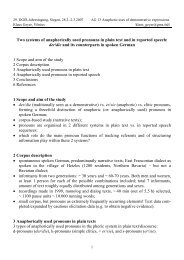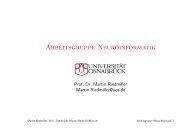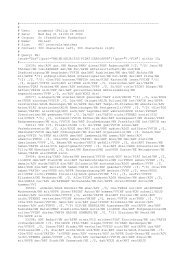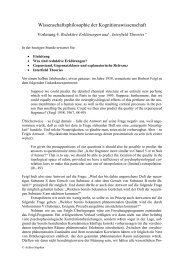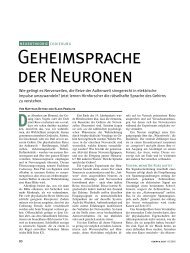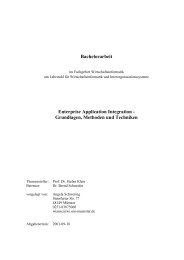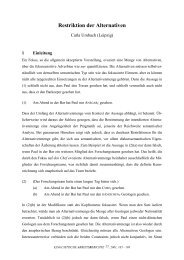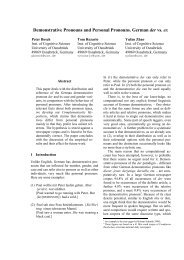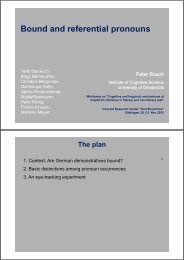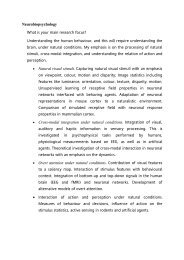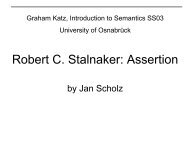Zur Referenz der französischen Pronomina il, lui ... - Cognitive Science
Zur Referenz der französischen Pronomina il, lui ... - Cognitive Science
Zur Referenz der französischen Pronomina il, lui ... - Cognitive Science
Erfolgreiche ePaper selbst erstellen
Machen Sie aus Ihren PDF Publikationen ein blätterbares Flipbook mit unserer einzigartigen Google optimierten e-Paper Software.
Literaturverzeichnis<br />
<strong>Referenz</strong>en<br />
Bosch, P. & Umbach, C. (2006). Reference Determination for Demonstrative Pronouns.<br />
In: Dagmar Bittner (ed.), Proceedings of Conference on Intersentential <strong>Pronomina</strong>l<br />
Reference in Ch<strong>il</strong>d and Adult Language, Centre for General Linguistics,<br />
Typology and Universals Research (ZAS).<br />
Bosch, P., Katz, G. & Umbach, C. (2007). Demonstrative Pronouns and Personal Pronouns.<br />
German <strong>der</strong> vs. er. Proceedings of the EACL2003. Budapest. Workshop on<br />
The Computational Treatment of Anaphora.<br />
Caddéo, S. (2004). Lui, le propriétaire, le propriétaire, <strong>lui</strong> : deux constructions bien<br />
distinctes. Recherches sur le français parlé, n° 18, pp. 145-161.<br />
Cappeau, P. (2004). Les formes disjointes des pronoms sujets. Recherches sur le français<br />
parlé, n° 18, pp. 107-125.<br />
Corblin, F. (1998). Ce<strong>lui</strong>-ci anaphorique : un mentionnel. Langue Française.<br />
Flämig, W. (1991). Grammatik des Deutschen: Einführung in Struktur und Wirkungszusammenhänge;<br />
erarbeitet auf <strong>der</strong> theoretischen Grundlage <strong>der</strong> „Grundzüge einer<br />
deutschen Grammatik―. Berlin: Akademie-Verlag.<br />
Grevisse, M. (2007). Le bon usage. 14° édition. Duculot.<br />
Kleiber, G. (1994a). Y a-t-<strong>il</strong> un Il ostensif ? In: Anaphores et Pronoms, pp. 125-141. Louvain-la-Neuve:<br />
Duculot.<br />
Kleiber, G. (1994b). Ce<strong>lui</strong>-ci/-là. Comment montrer du nouveau avec du déjà connu. In:<br />
Anaphores et Pronoms, pp. 177-211. Louvain-la-Neuve: Duculot.<br />
Krötsch, M. & Sabban, A. (1990). « Bleu, je veux » - Remarques sur la focalisation en<br />
français. Zeitschrift für romanische Ph<strong>il</strong>ologie (ZrP), Band 106.<br />
Kuno, S. (1976). Subject, theme and the speaker’s empathy: A reexamination of relativization<br />
phenomena. In: Charles Li (ed.), Subject and Topic, pp. 417-444. New<br />
York: Academic Press.<br />
Kuno, S. & Kaburaki, E. (1977). Empathy and Syntax. Linguistic Inquiry, Volume 8<br />
Number 4, pp. 627-672.<br />
Muller, Ch. (1979). Une expérience de statistique métalinguistique. In: Langue française<br />
et linguistique quantitative: recue<strong>il</strong> d’articles, pp. 309-323. Genève: Slatkine.<br />
Nølke, H. (1997). Anaphoricité et focalisation : le cas du pronom personnel disjoint.<br />
In: W. De Mul<strong>der</strong>, L. Tasmowski-De Ryck, & C. Vetters (eds.), Relations anaphoriques<br />
et (in)cohérences, pp. 55-67. Amsterdam: Rodopi.<br />
43



